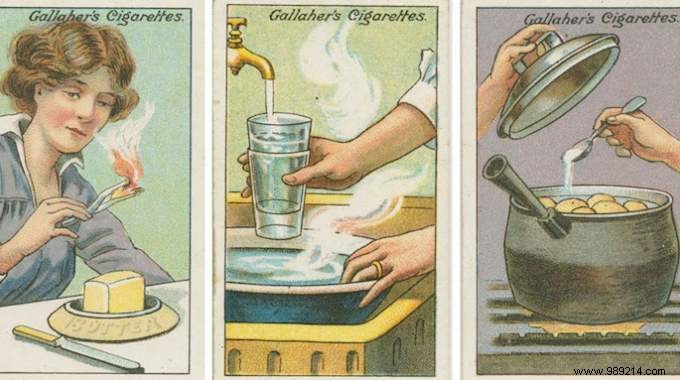
When you're looking for a tip, you don't necessarily think of the early years 1900.
However, we have a lot to learn from the Belle Époque.
It is about this period which extends from the end of the 19th century to the beginning of the First World War, in 1914.
Fortunately, the New York Public Library has just digitized about a hundred "tip cards", which were found in cigarette packets of the time.
And can you imagine that these tips are still as effective, despite the fact that they are now over 100 years old !
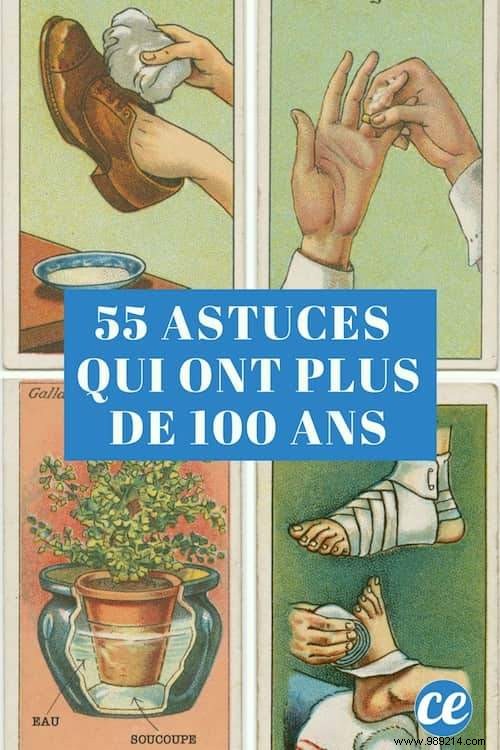
For the record, in the past, cigarette manufacturers inserted cardboard into the packets to stiffen them and prevent the cigarettes from breaking.
People used to collect these boxes which were often illustrated with advertisements or celebrities of the moment.
The British cigarette brand Gallaher, the largest cigarette manufacturer at the time, had a brilliant idea:turn cigarette cartons into trick cards .
These cards, which were very successful, were called the How To or How To in French.
All of these tip cards are part of the George Arents Collection at the New York Public Library (one of the largest libraries in the world).
Today we share with you these 55 grandma life hacks that are over 100 years old, but still work today. Watch:
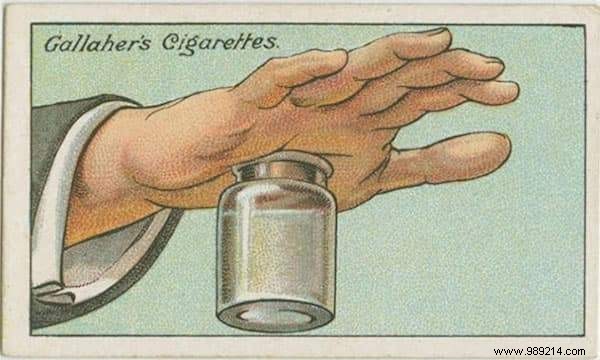
"Extracting a splinter from the hand is often very painful. The best way to remove it is to fill a small, wide-mouthed glass jar with hot water, almost to the brim . Firmly press the affected area of your hand on the neck of the glass jar. The suction effect will pull on the flesh, and the steam produced will quickly extract the splinter." Discover the trick here.
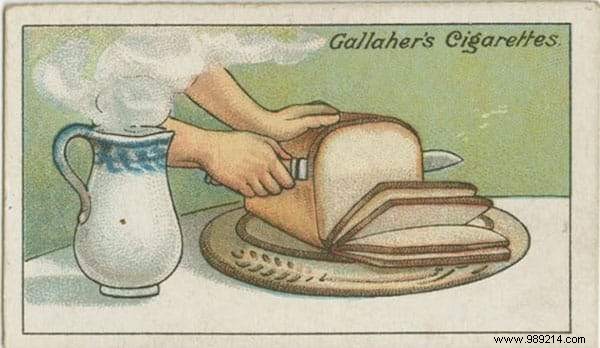
"Cutting fresh bread into thin slices is far from easy. The trick is to dip a bread knife in hot water. Once it's hot, take it out and dry it quickly. The heated knife will allow you to cut fresh bread easily, and to obtain the thinnest slices." And to cut the bread without putting crumbs everywhere, discover the trick here.
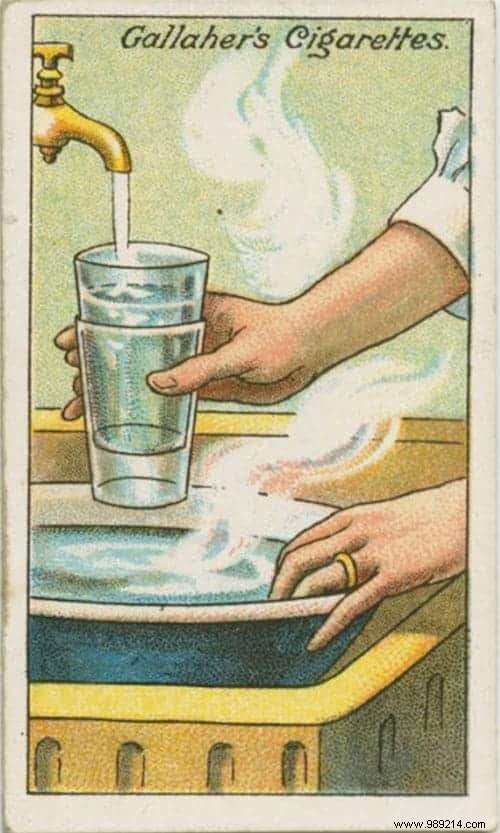
"When 2 glasses are stuck in each other, do not force them to loosen them at the risk of breaking them. The simplest and most effective method to separate the glasses is to put cold water in the glass top and dip the bottom one in hot water. In a few minutes, the 2 stuck glasses will come apart easily." Check out the trick here.

"To revive beautiful cut flowers that have faded during a trip, immerse the stems in very hot water. Let them sit in the water until it cools and your flowers will be revived. Then cut the tips of the stems and put your flowers in cold water as usual." You can also use the baking soda trick here.
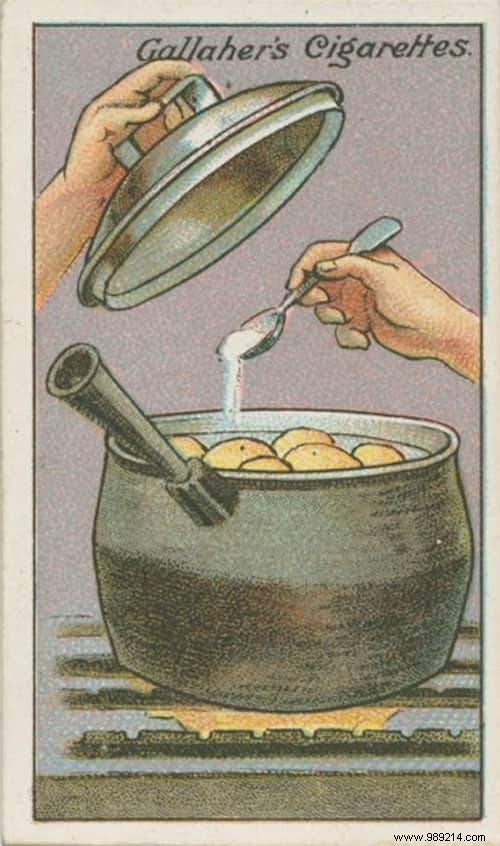
“For very dry and tastier potatoes, add a pinch of sugar and salt to the cooking water. When the potatoes are ready, pour out the water and put the pan back on the heat for a short time. Stir occasionally to make sure the potatoes dry evenly.”
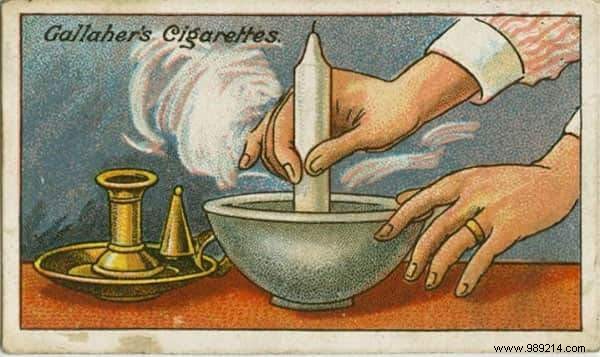
"When a candle is too thick for a candle holder, do not try to trim it. Instead, dip the tip of the candle in a bowl of hot water and wait for the heat to soften the wax. If you squeeze the candle in the candle holder, it will now hold in place."
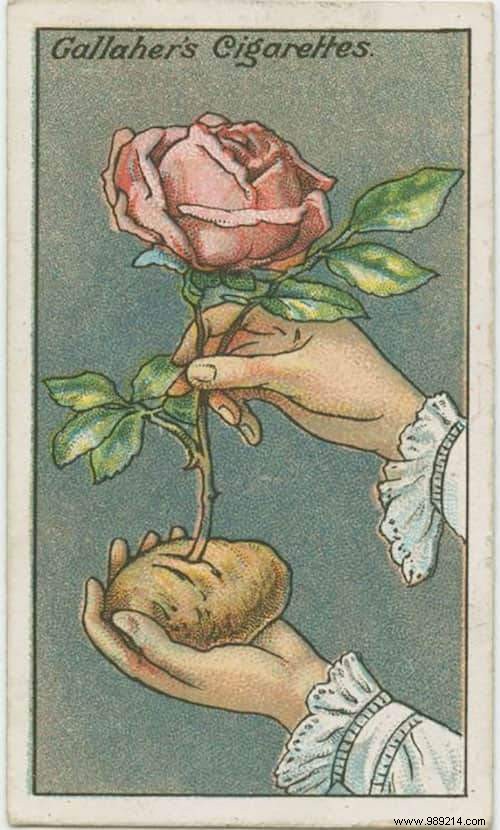
"This is an excellent method to prevent the flowers from withering during a long journey. Make small holes in raw potatoes, and insert the tips of the flower stems into them. Stored in this way, the flowers can stay fresh for a whole week or more. Use paper or cotton wool to hold the flowers in place."
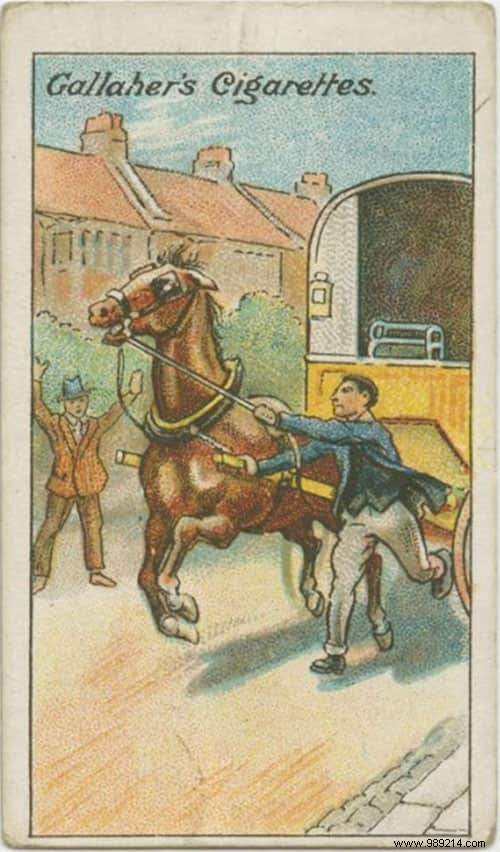
"Never stand in front of a runaway horse. Rather, run beside it and use the hand closest to the horse to grab the hitch arm. Keep your arm straight to maintain a safe distance. Then with your hands free, grab the horse's reins and pull them to bring the horse to a stop. Never jump, flail or shout. This frightens horses." Check out the trick here.
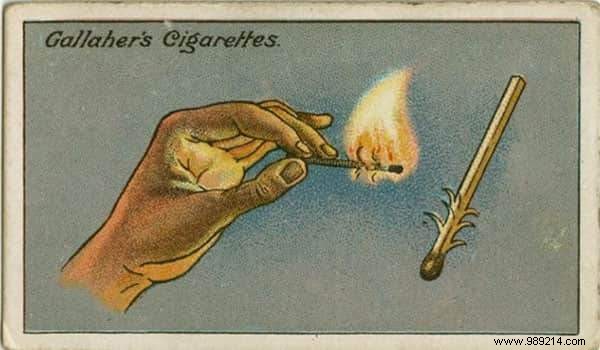
"Here is the trick to circumvent the recurring problem of lighting a match when it is windy. Cut the wood to make small shavings towards the head of the match, as shown in the illustration above. When you strike the match, the shavings will catch fire. This way, the flame will be stronger and will have a better chance of resisting the wind."
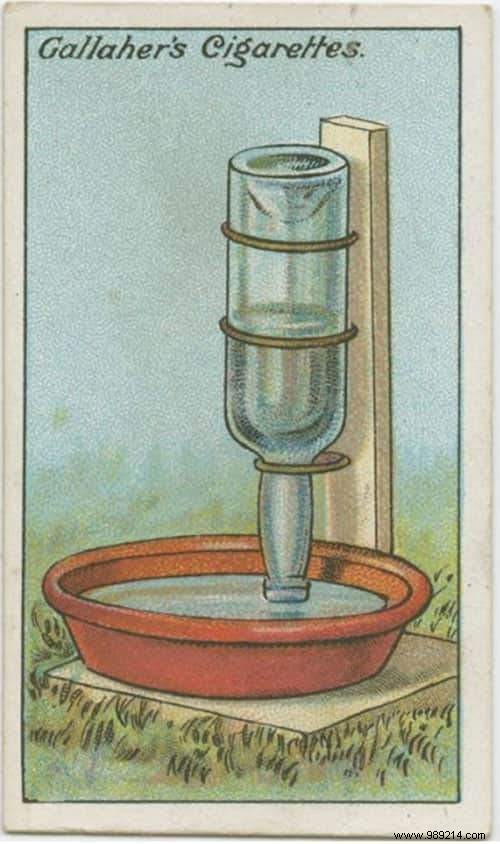
"Here is a simple waterer for dispensing fresh water to hens. Secure a wine bottle to a wooden post with loops of wire, as shown in this illustration. The bottle should be put upside down, at the above a ceramic flower pot cup. Position the neck of the bottle 1 or 2 centimeters from the bottom of the cup."
To discover: 10 Tips For Your Chicken Coop That Your Hens Will Love!
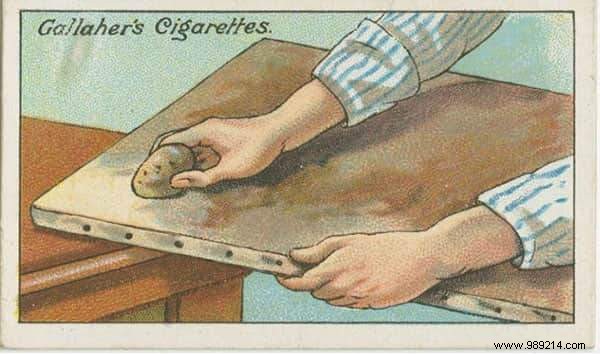
"This illustration shows a very effective method of cleaning a painting made with oil paint. First, remove the dust from the canvas. Cut a potato and use the surface of the cut part to gently rub the canvas. With a soft cloth, wipe off the traces of potato. To always have a clean surface to apply to the canvas, cut the potato as soon as it begins to blacken. Complete the cleaning with a wipe of a cloth soaked in linseed oil."
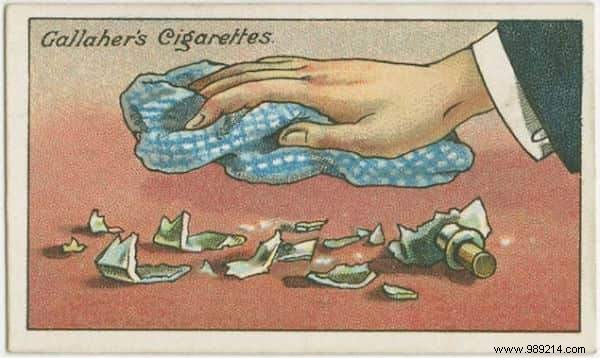
"Use a damp cloth to pick up broken glass quickly and cleanly. This is the most effective method, as even the smallest glass shards will cling to the cloth. It is advisable to use an old cloth which you can then throw in the trash with the broken glass." It also works with newspaper.
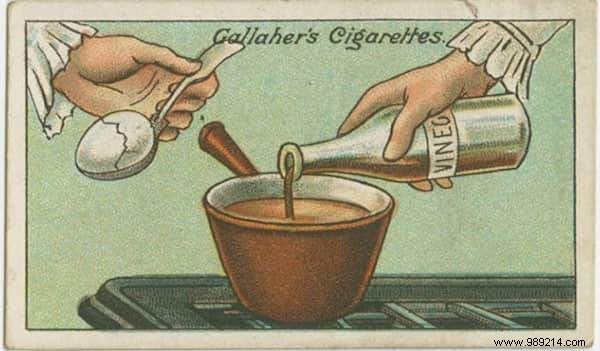
"To make hard-boiled eggs from eggs with cracked shells, add a little white vinegar to the cooking water. This way, the vinegar water will prevent the contents of the eggs from spilling out."
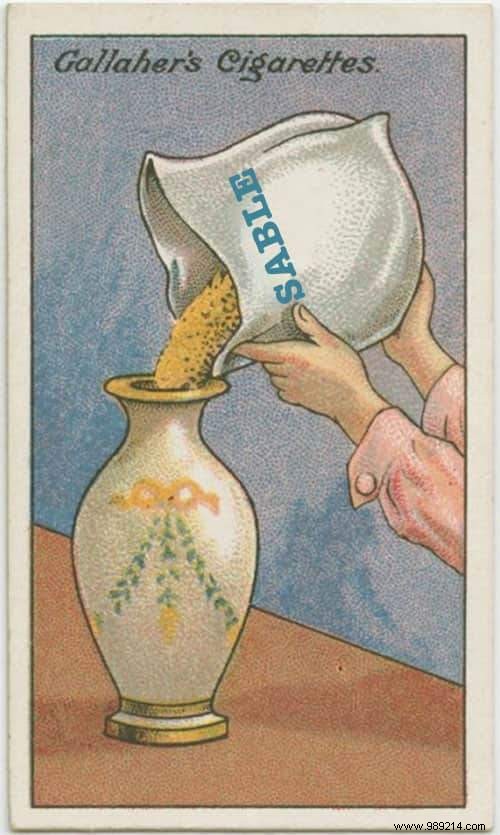
"With the following precaution, you will greatly reduce the risk of knocking over your valuable vases. To do this, half fill the vase with sand. The sand will act as a weight, and hold the vase upright and firm at its This trick is especially effective for vases that have a small base."
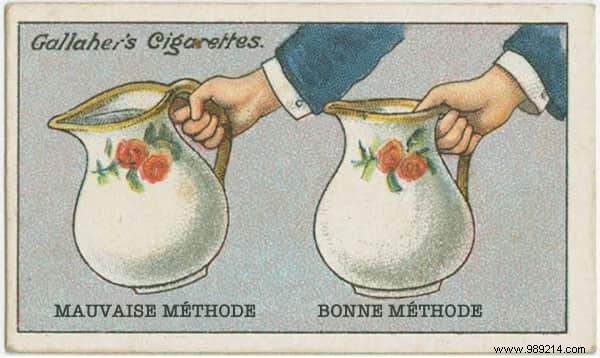
"This illustration tells us how you should hold a heavy jug so as not to spill the liquid inside. It is the image on the right that shows the correct way to hold it, so that the weight of the jug is better distributed . Thus, it avoids spilling its contents."
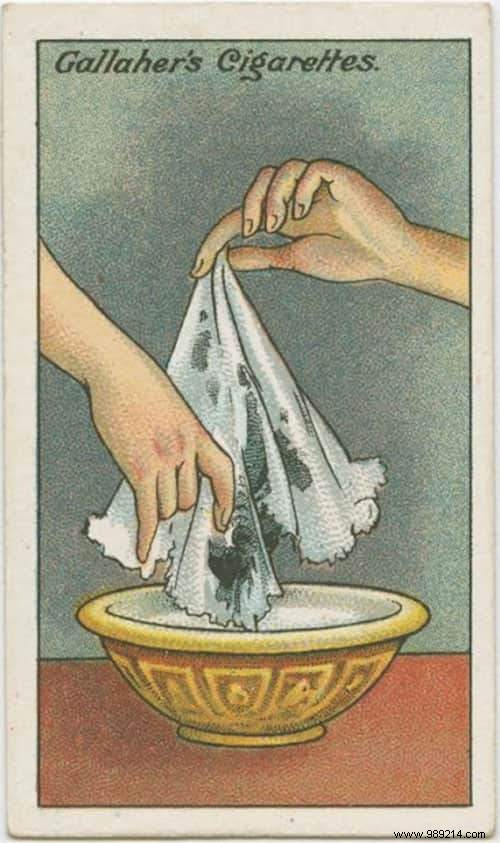
"Here's how to clean a fabric that has unfortunately been stained with ink. Immediately after staining it, dip the handkerchief in milk. Soak it for a while, and you will see that the ink stains will be gone." Check out the trick here.
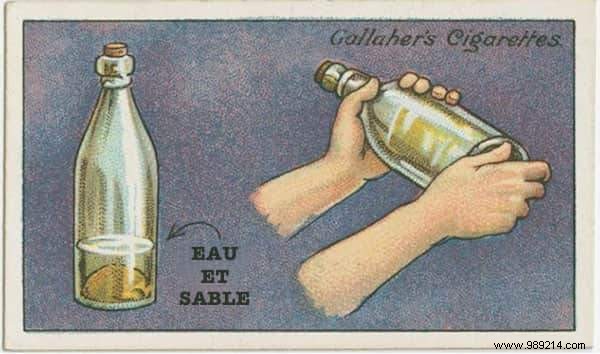
“To clean the inside of a glass bottle, pour some sand and water into it, then give it a good shake. This will clean the entire inside surface of the bottle. 'rinse and let dry."
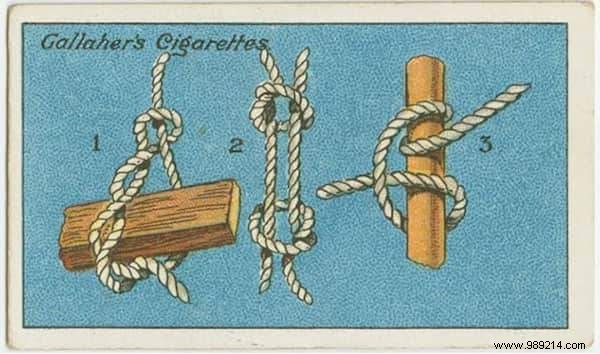
"No. 1, the wooden knot, is particularly suitable for lifting beams or other heavy loads.
"No. 2, the fisherman's knot, is a good way to securely join two ropes together.
"No. 3 is the famous capstan knot. The more you pull on it, the tighter it is."
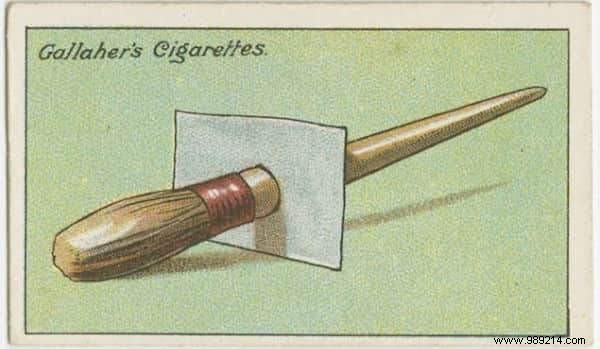
"Here is a trick to avoid being inconvenienced by paint running down the handles of brushes, an unpleasant problem for amateur painters. To do this, take a piece of cardboard or sheet metal, and drill a hole in it in which you can work the handle of the brush in. As shown in this illustration, this will prevent the paint from dripping onto your fingers."
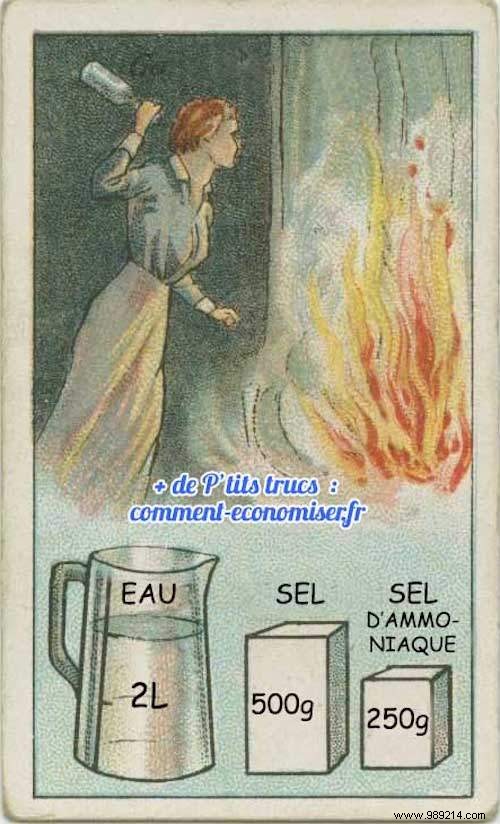
"To make a homemade fire extinguisher, mix 500 g of salt and 250 g of sal ammoniac in 2 liters of water. Put everything in thin glass bottles, which can hold about 1 liter each. If a fire starts, break one or more of the bottles on the fire to prevent the flames from spreading." Check out the trick here.
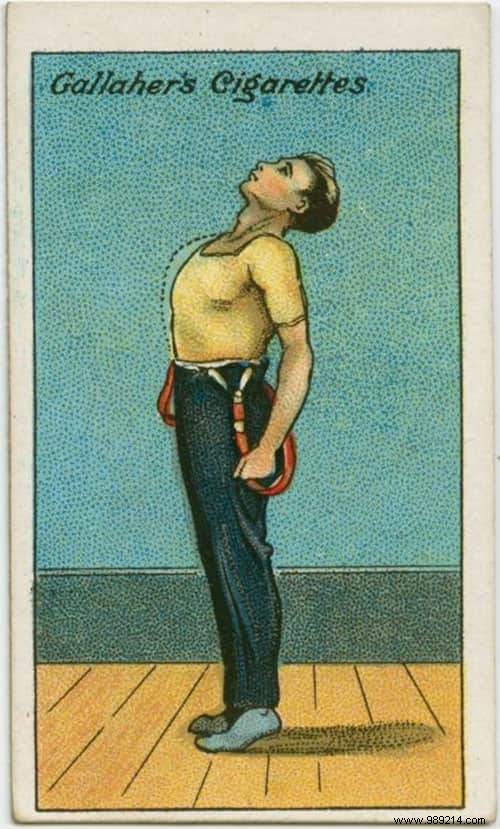
"Stand up straight on the front of the soles of your feet, and tilt your head well back. Next, breathe in deeply until your lungs are fully inflated. Exhale the air from your lungs slowly, letting first your chest drops, then your lungs. Repeat this exercise several times, morning and evening. After a while, you will have more breath."
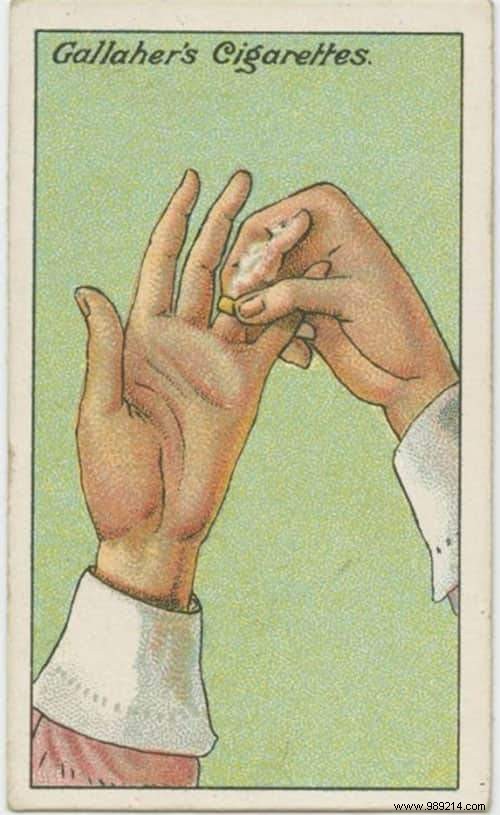
"To remove a ring that is too tight easily and without pain, you must first rub soap on the finger. If the joints are not swollen, the ring will come off easily. But in the case of a swollen finger or joint, it is recommended to use a jeweler." You can also use this trick with dental floss.
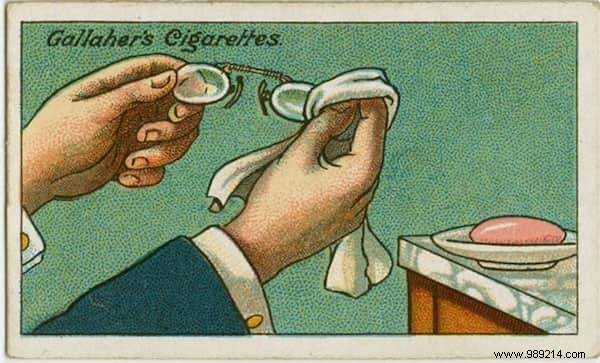
"The fog that forms on spectacle lenses is particularly annoying. The trick is to put a little soap on the lenses every day, then rub them with a soft cloth. This will create a thin colorless film that protects glasses from any condensation." And to keep your glasses clean 3 times longer, use this trick.
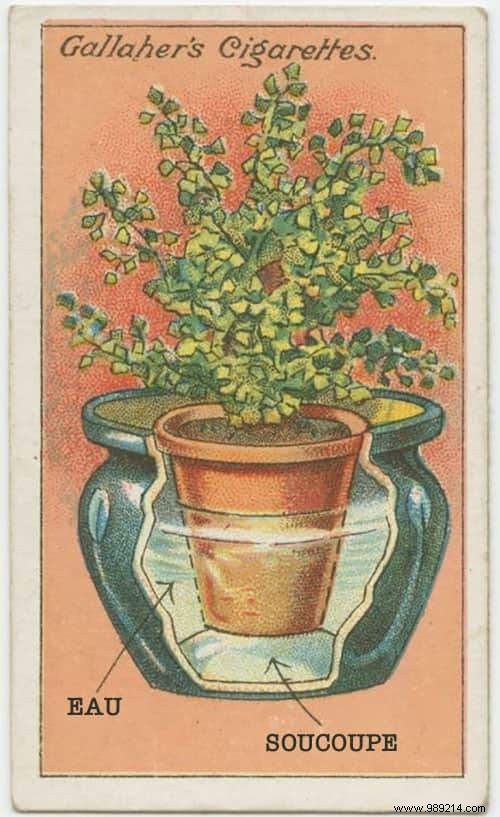
"The best way to grow hair fern is to place the flower pot it is planted in on an upturned saucer inside a tall vase or cachepot. Fill the vase halfway with water approximately. Place the fern in a cool place and make sure it always has water. Never water this type of fern by placing it under the tap."
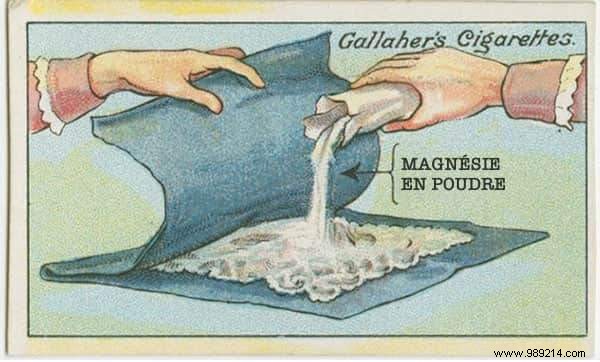
"To clean the fine lace, first place it on a sheet of tissue paper. Sprinkle it generously with powdered magnesia. Then, cover the lace with tissue paper and put weight on it for a few days . Shake to remove the powder and you will find that the lace is clean, while preserving even the finest of embroideries."
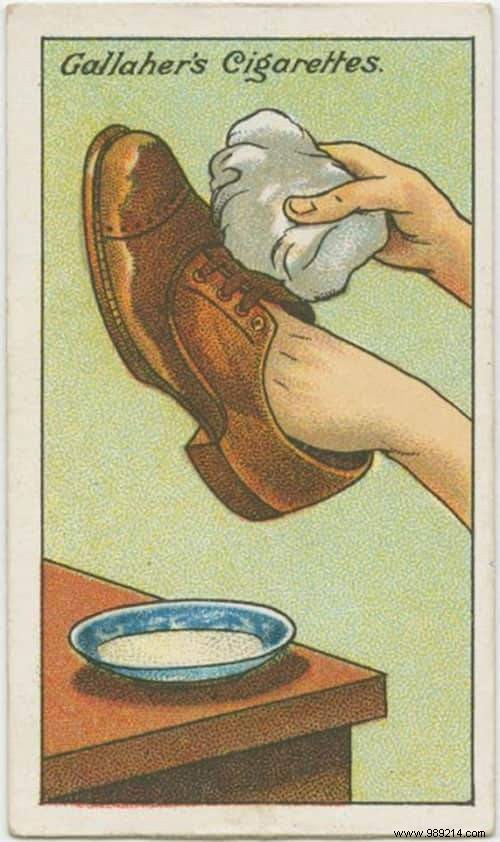
"After a visit to the seaside, you notice that seawater has stained your brown leather shoes. Clean this type of stain with a preparation made up of a hazelnut of soda crystals mixed with 2 tablespoons of warm milk. Once dry, polish your shoes as usual, and you will see that the stains will be gone."
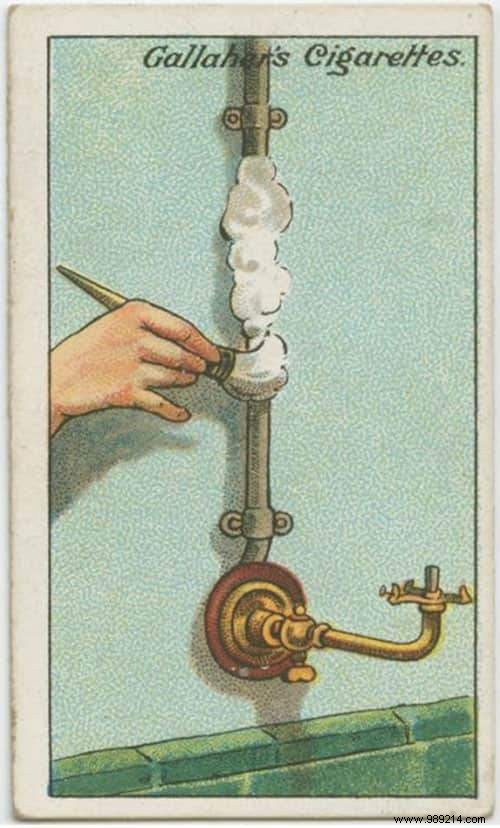
"Trying to find a gas leak with a lamp is not without risk. On the other hand, the process illustrated by this image is reliable and without any risk. Apply strongly soapy water to the pipe on which you suspect that there is a leak. Soap bubbles will form where the gas is escaping, allowing you to quickly seal the leak."
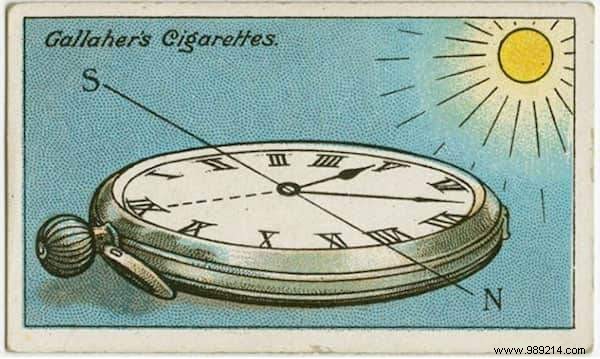
"To find the cardinal points with your watch, point the hour hand (the small hand) in the direction of the sun. Then, divide by 2 the angle between the hour hand and the number 12. Spread a piece of thread (or a blade of grass) starting from this angle, always between the hour hand and the number 12. The end of the thread to the left of the hour hand indicates the south." Check out the detailed explanation here.
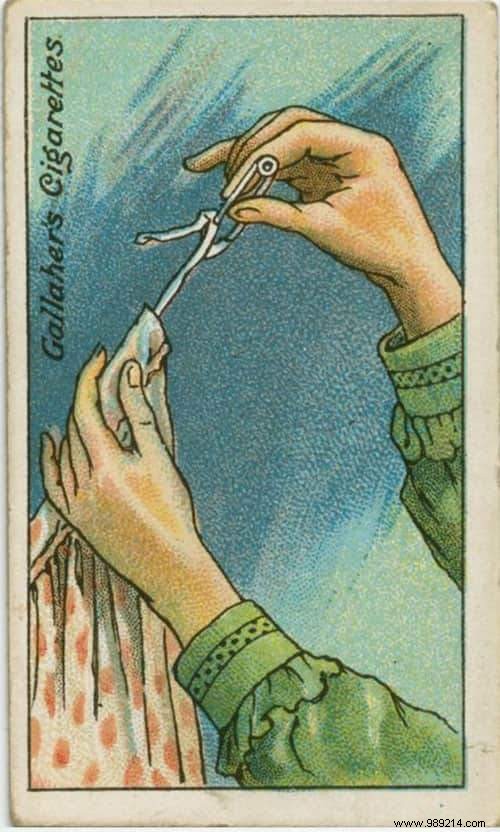
"In most cases, a simple safety pin replaces your shoelace. Pin the end of the ribbon (or cord) and thread it through the hem, as you normally would with a shoelace. "
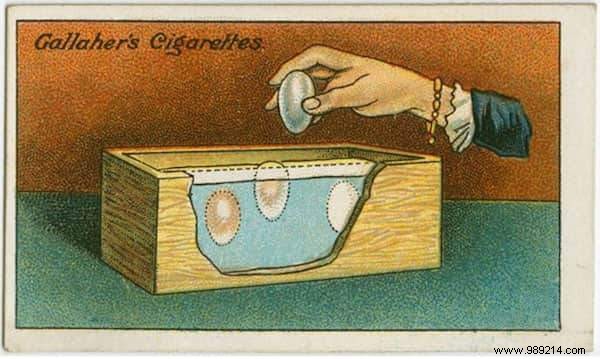
"Here's how to store freshly laid eggs for a very long time. Just put them in a box filled with salt (burying the eggs in the salt), then store the box in a dry, cool place. Air must not come into contact with the eggs."
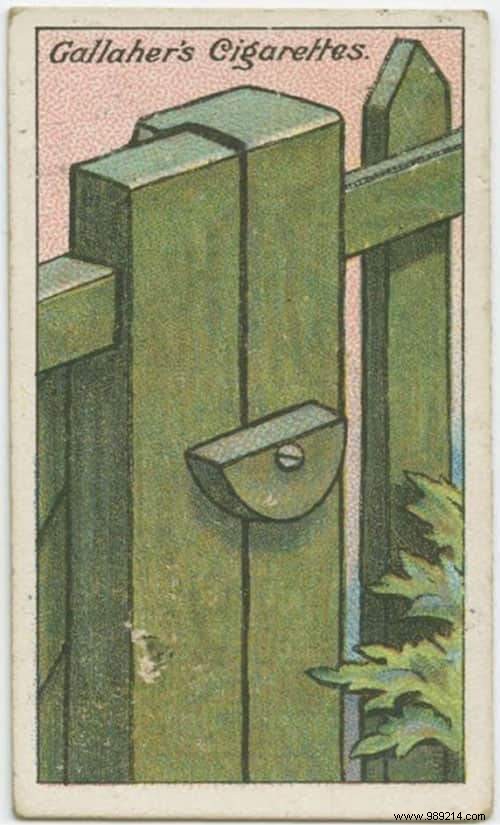
"With ordinary locks, gates tend to loosen and open on their own. This illustration shows a form of lock that will put an end to this problem. Once screwed to the gate post, this lock swings on its own in the closed position, since almost all of its weight is distributed below the pivot screw."
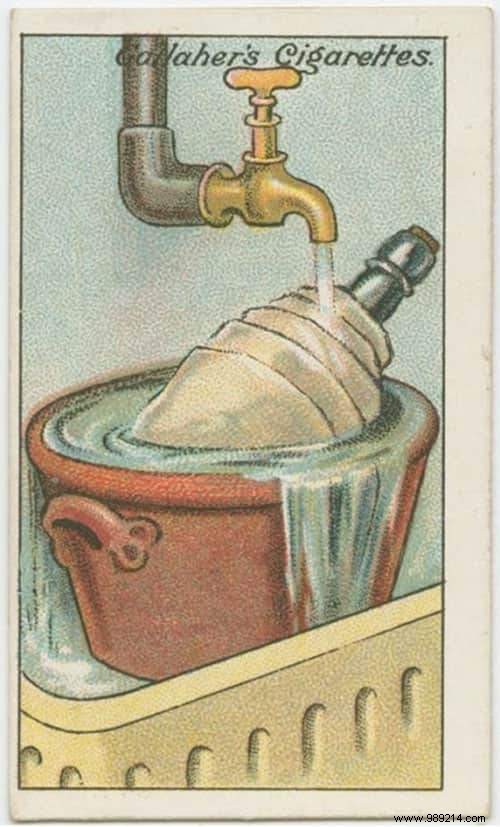
"If you don't have ice cubes to chill wine, a good method is to wrap the bottle in a small towel and place it in a large container. Let cold tap water run over the bottle , as in the illustration. After about 10 minutes, your wine will be perfectly chilled and ready to serve." Discover here another trick to cool your beer.
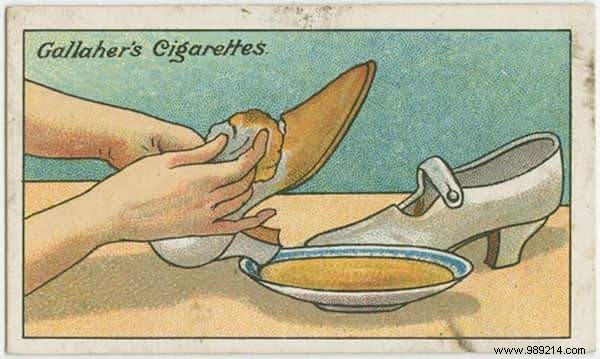
"Here's how to refresh white suede shoes by giving them a nice tawny color. Mix 10 drops of saffron extract with 3 teaspoons of vegetable oil. Clean the shoes well before applying the mixture which must be rubbed on the leather with a soft cloth. Complete this cleaning with a waterproofing treatment."
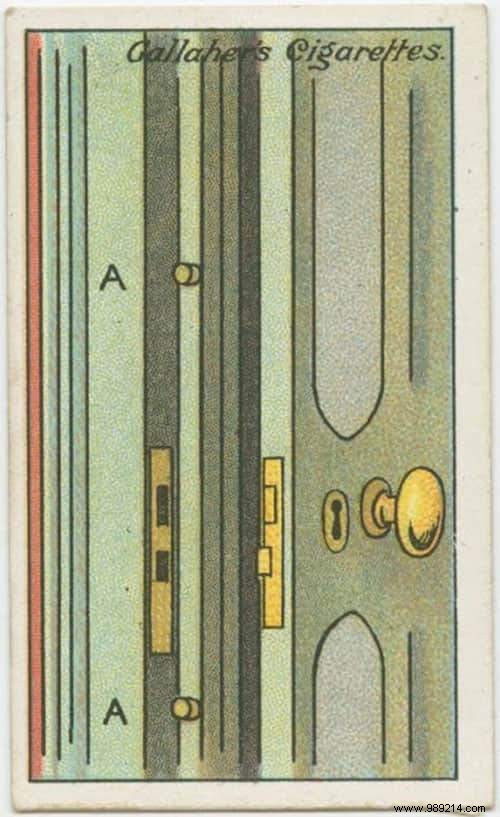
"To prevent the sound of a door moving in windy conditions, stick cork washers into the door frame as shown by points A in this illustration. The washers should be slightly more thicker than the space between the door and the frame. While the glue dries, hold the door closed to put pressure on the washers. The elasticity of the cork will hold the door in place and prevent it from rattling even with the wind."
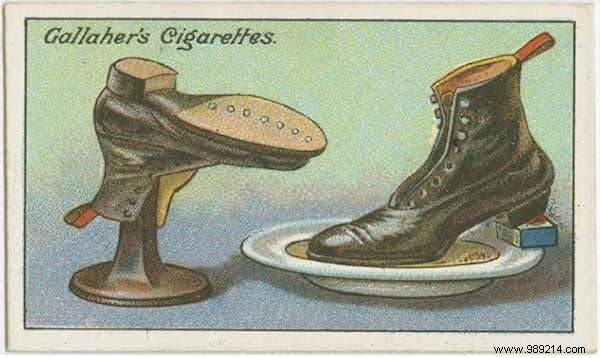
"When a new pair of ankle boots with a leather sole makes a squeaking noise when walking, the trick is to drive several finishing nails along the middle of the sole. Another method is to put the sole in a flat or a plate filled with oil. The heel should be raised so that the entire front of the sole is immersed in the oil. Soak until the oil completely penetrates the leather of the sole."
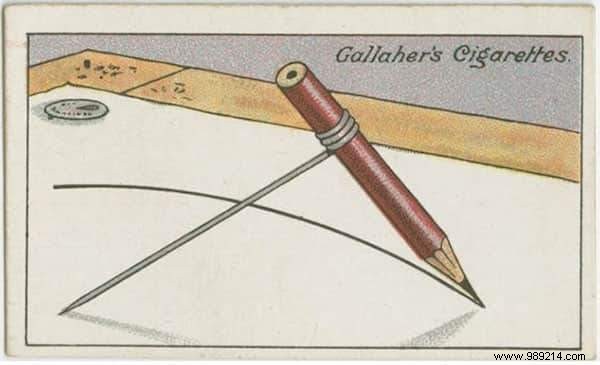
"Twist one end of a piece of wire around the pencil. Leave the other end of the wire straight and sharpen it to a point to use as a compass point. To change the size of your circle, simply to bend the wire to adjust the point of the compass." Learn how to make a freehand circle here.
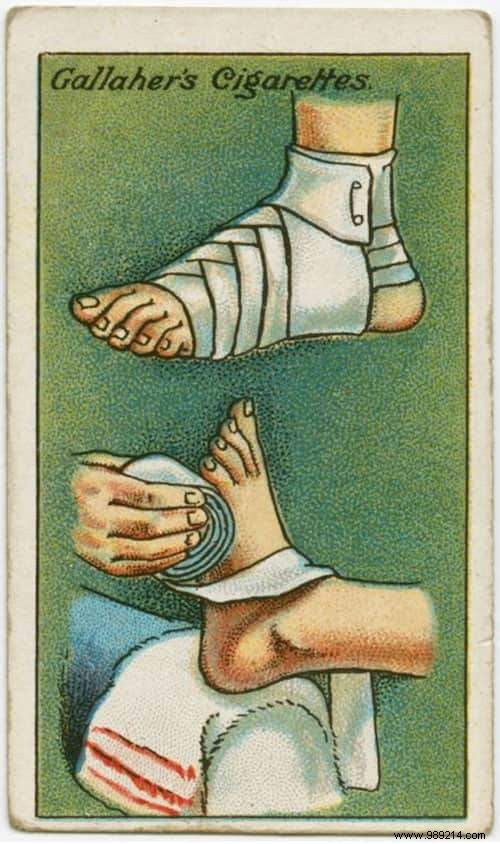
"The injured foot should rest on the knee of the person who is going to wrap the bandage. Begin wrapping as in the bottom illustration, wrapping it in a spiral over and then around the back of the foot. Continue wrapping spiral foot and secure the bandage with a safety pin, just below the ankle, as in the top illustration."
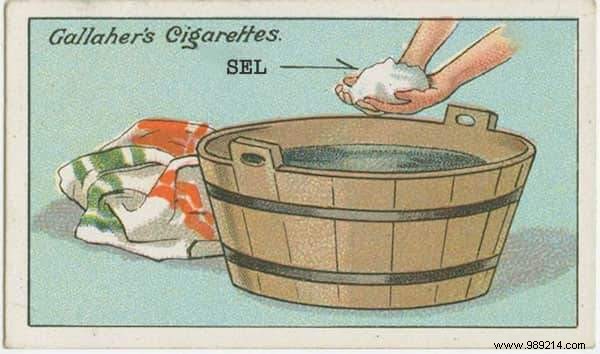
"To prevent your colored laundry from rubbing onto your other clothes, first soak it in a salt water bath. The right amount for this bath is a 2 handful of salt to about 4 liters of water. Let your colored laundry soak in this solution for about 24 hours."
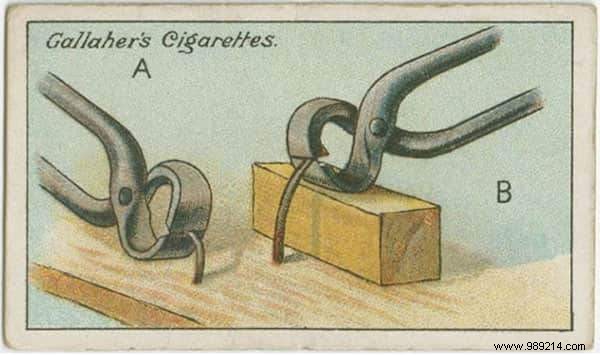
"Pulling out a long nail stuck in wood is often a complicated task. Indeed, once you start to pull the nail out, the pliers no longer have enough support to pull it out completely, as you can see in illustration A. But by placing a small piece of wood under the pliers, as in illustration B, the nail can be removed without any difficulty."
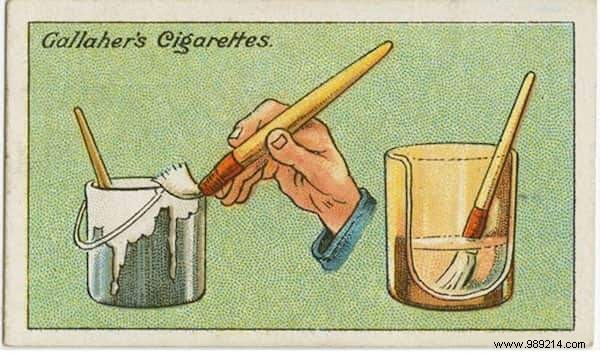
"Once your painting jobs are finished, one of the most important things is to take good care of your brushes. First, the brush should be cleaned, carefully scraping the bristles against the neck of the paint can. Then, use a rag to squeeze strong on the bristles of the brush in your hands. Store the brush in a jar, with just enough water to cover the bristles." If your brushes have already hardened, use this trick here.
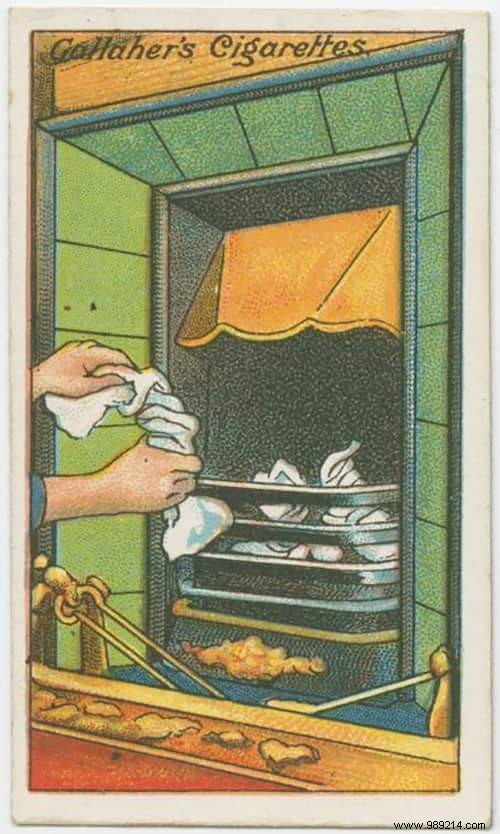
"Here's a great trick for when you don't have kindling to light a fire. Make fire starters by twisting pieces of newspaper tightly together, as in the illustration. This is an ingenious method of lighting a fire with only a few pages of a newspaper."
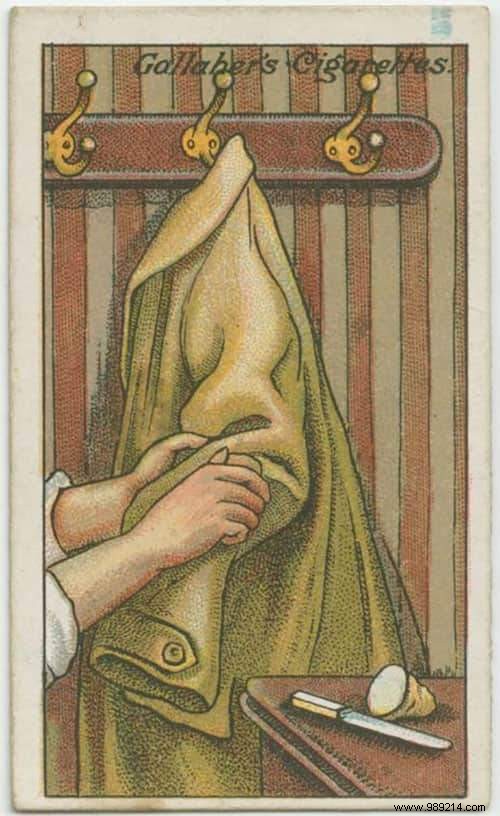
"Here is a simple and affordable method for cleaning stains and dirt marks on a raincoat. Just rub them with a raw, peeled potato. Know that this method also works against mud stains on skirts, coats, pants and other garments."
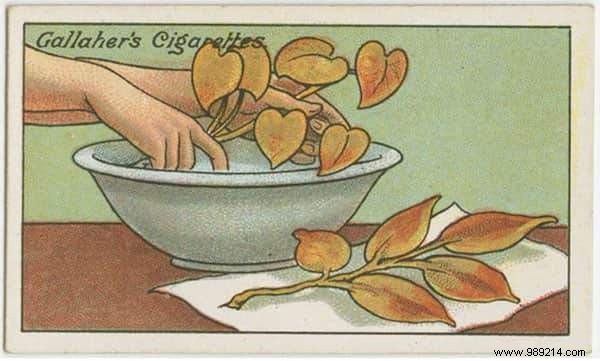
"The rich and varied colors of fall foliage make them interesting to keep. You can do this by mixing one part liquid vegetable glycerine with 2 parts water. Immerse your leaves completely in this mixture by placing a pebble on them for 3 to 5 days. Then, take the leaves out of the mixture and place them flat on a clean, smooth surface. With this treatment, the leaves will become shiny, soft to the touch and they will keep for many years."
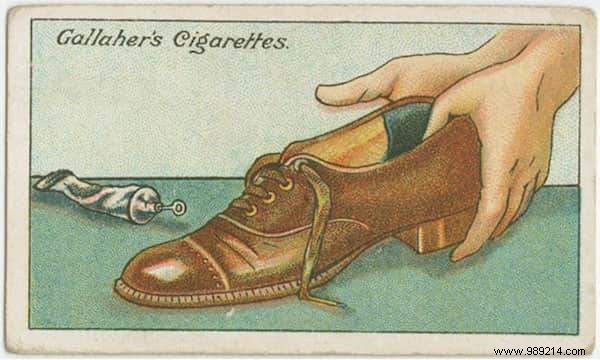
"Here's how to stop slipping in shoes that are too big. Just use strong glue to fix a piece of velvet inside the shoe, at the heel, as shown in this illustration. Do well be careful that there are no creases left on the glued velvet."
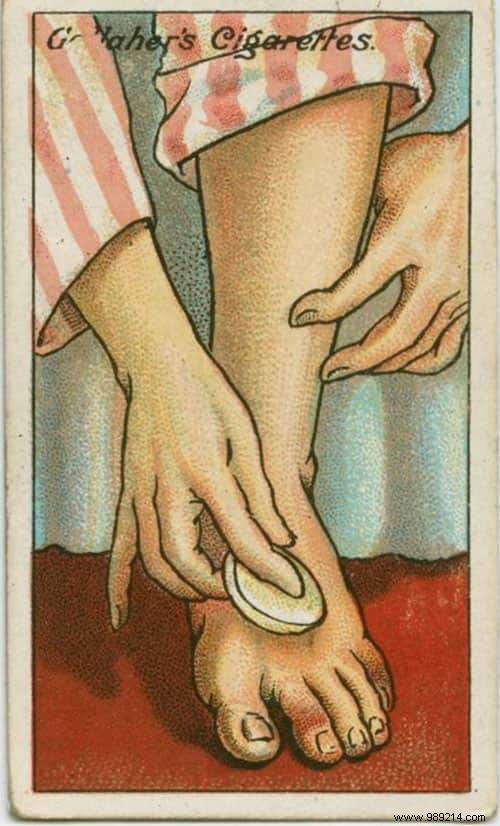
"A simple but effective remedy to immediately relieve pain and irritation due to frostbite is to use salt and apple juice. To do this, simply rub the affected areas with a wedge of apple sprinkled with table salt. For more efficiency, use a very juicy apple."
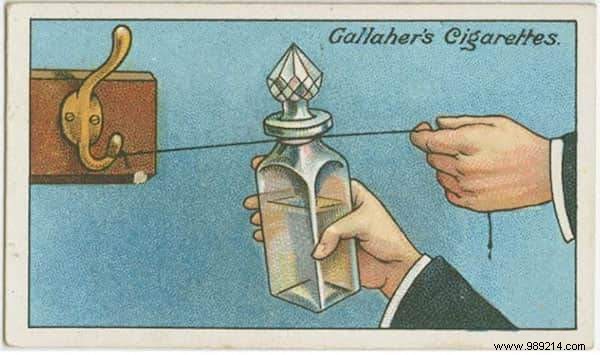
"There are several methods of unjamming a glass stopper, but the one in this illustration is one of the best. Tie a strong piece of string to a fixed support. Wrap the string around the outside of the neck, at the level of the stopper. Then rub the bottle on the string in a back and forth motion until the neck of the bottle begins to heat up.The heat will cause the glass to expand and the cork to loosen on its own. "

"Here's how to recap a bottle when the cork is too wide. Instead of cutting the cork with a knife, use the method in this illustration. Roll the cork under the sole of your foot, while applying constant pressure. This method will reduce the thickness of the cork, while maintaining a smooth surface." You can also use this trick.
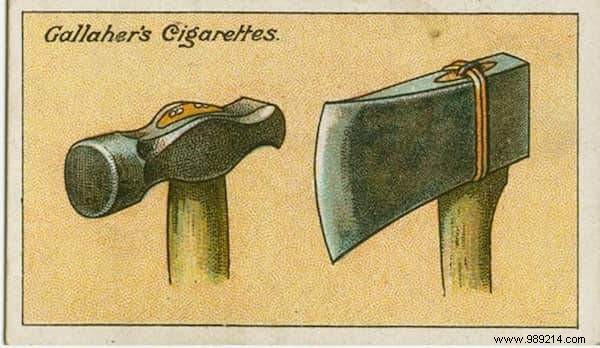
"Here is a good technique for attaching a hammer or an ax to its handle. After pushing the handle of the hammer in as far as possible, drill two holes in the end of the handle and screw in two large screws. To hold an iron securely in place of an ax, drill a hole in the handle just below the blade. Then insert a wire through the hole and thread it around the blade of the ax. Finally, twist the wire and hold everything in place with a cavalier nail."
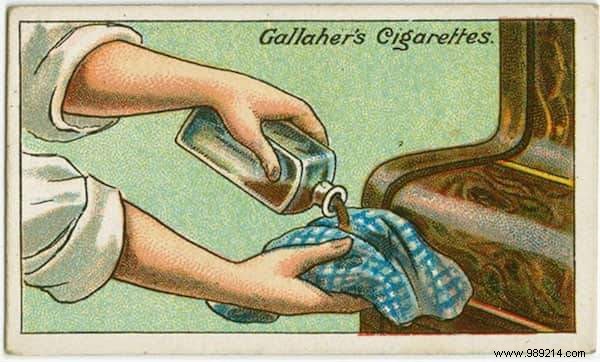
"Here is the recipe for an excellent oil to make the wood of frames, pianos, parquet floors, etc. shine. In a bottle, mix equal parts paraffin oil and white vinegar. Stopper the bottle before Adding a few drops of lavender essential oil will give you a pleasant scent and also keep flies away."
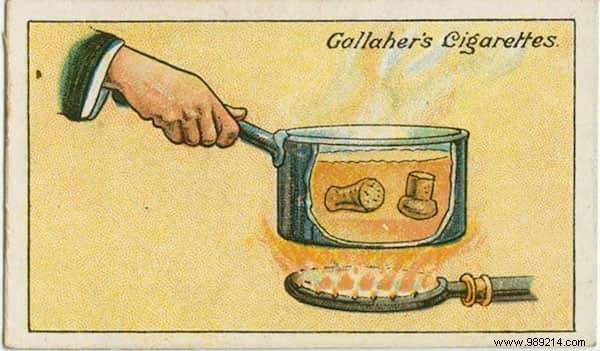
"Dans une vieille casserole, faites fondre environ 50 grammes de paraffine. Plongez-y les bouchons de manière à ce qu'ils soient totalement recouverts par la cire fondue. Ainsi traités, vos bouchons seront non seulement imperméables aux liquides, mais aussi à l'air."
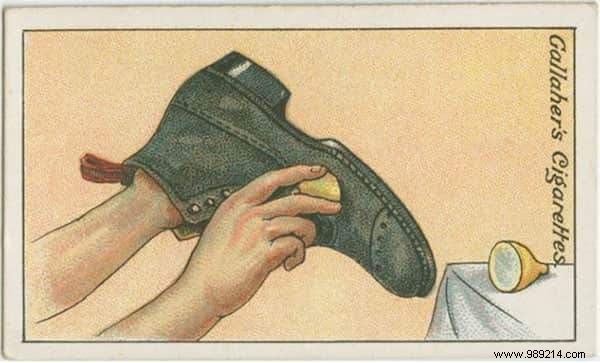
"Le cuir des chaussures neuves est parfois très difficile à cirer. Une méthode efficace est de frotter le cuir avec la face coupée d'un demi-citron. Laissez sécher le jus, après quoi vous allez pouvoir cirer vos chaussures facilement. Répétez ces applications de citron au besoin."
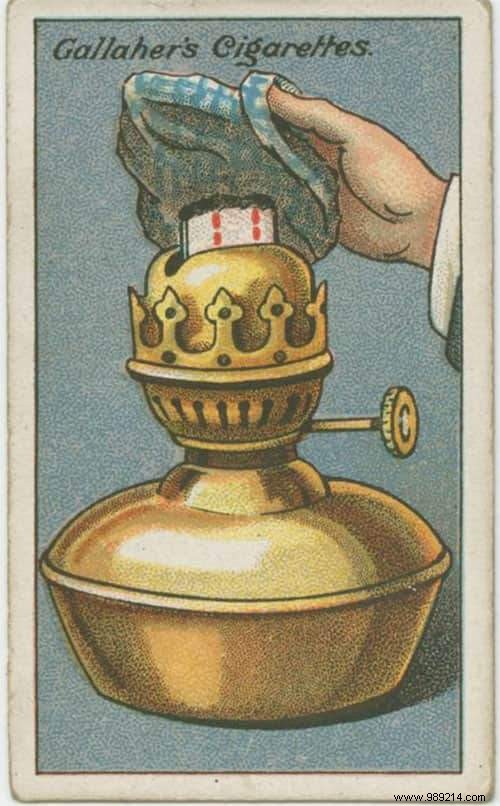
"La meilleure façon de moucher une mèche de lampe à pétrole est de pincer et retirer la partie brûlée à la main. Ne commencez jamais à moucher une mèche en la coupant avec des ciseaux. Seulement si la mèche est effilochée après l'avoir mouchée, alors vous pouvez utiliser des ciseaux pour soigneusement couper les bouts de fils qui dépassent."
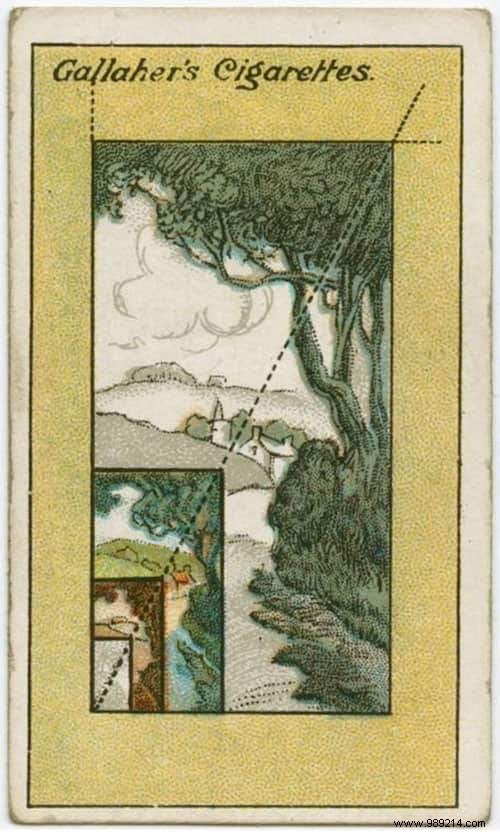
"Tracez une ligne verticale vers le haut depuis le côté gauche de l'image que vous souhaitez reproduire. Puis, tracez une ligne en partant du coin en bas à gauche vers le coin en haut à droite de l'image originale, et continuez cette diagonale. Ensuite, déterminez la hauteur désirée de votre reproduction, sur la ligne verticale de gauche. Tracez une ligne à angle droit à partir de ce point, et l'endroit où elle rencontre la ligne diagonale représente les proportions exactes de votre reproduction. Dans cette illustration, l'image d'origine est en couleur."
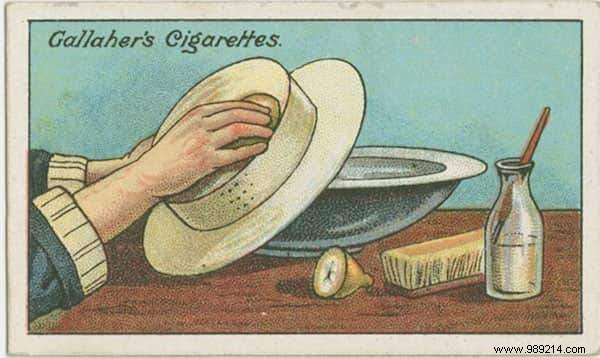
"Brossez le chapeau pour bien enlever toutes les poussières puis frottez-le avec un citron coupé en deux. C'est un nettoyage incroyablement efficace. Pour finir, appliquez une couche de gomme arabique liquide sur toute sa surface, et votre chapeau de paille sera comme neuf."
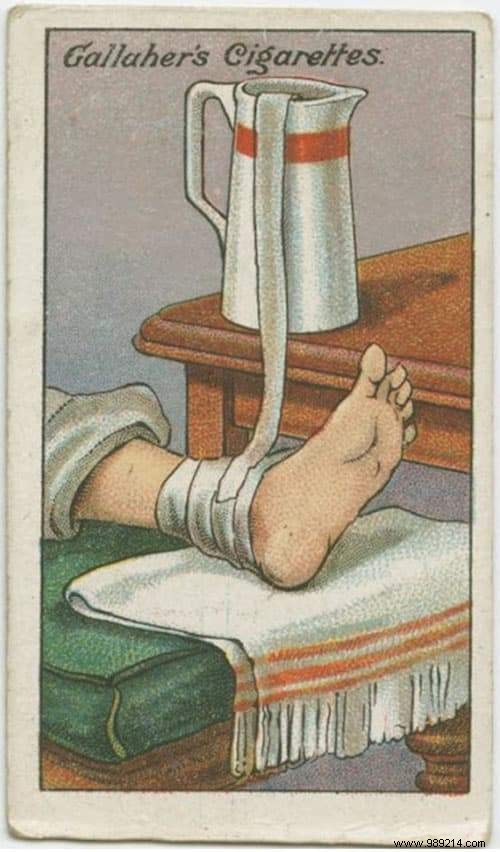
"Voici un remède instantané pour vous débarrasser d'un corps étranger dans l'œil. Pour éviter tout danger, il suffit de mettre un peu d'huile de ricin dans le coin de l'œil. Dans cette illustration, vous pouvez voir que l'on utilise la pointe d'un pinceau comme compte-gouttes. Si le corps étranger est une poussière de plâtre ou de la chaux, rincez l'œil avec de l'eau légèrement vinaigrée."
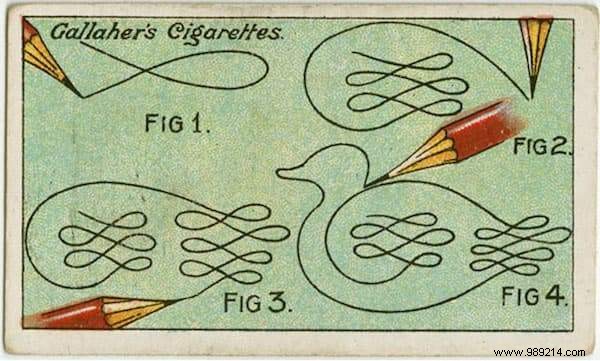
"Ces illustrations montrent comment vous pouvez dessiner un canard, sans jamais lever votre crayon de la feuille de papier. Une fois entraîné à le dessiner facilement, vous allez pouvoir épater vos amis avec ce nouveau talent."
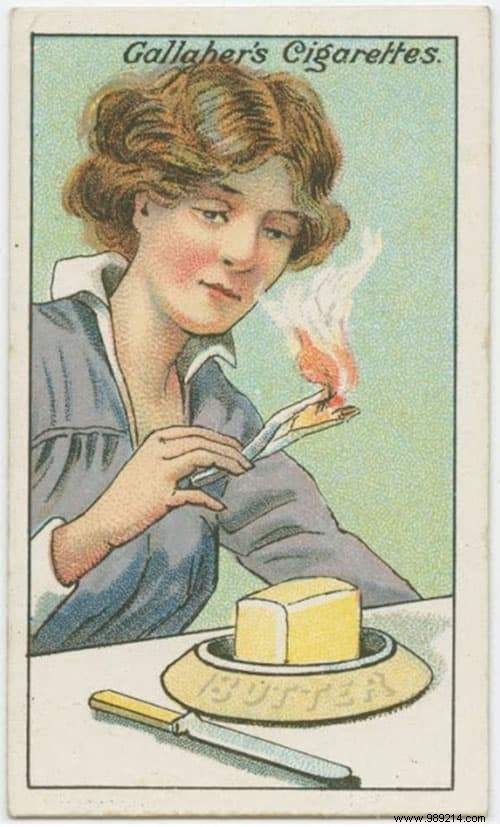
"Cette illustration montre la bonne méthode pour tester du beurre de qualité douteuse. Frottez un peu du beurre sur un morceau de papier, puis mettez le feu à ce papier. Si le beurre est pur, il aura une odeur agréable et délicate. En revanche, s’il contient de la margarine, il aura une odeur âcre de suif."
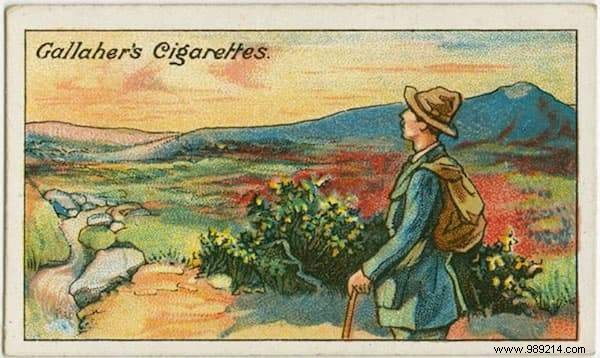
"Pour les randonneurs sur le point de partir au matin, un bon guide du temps à venir est de regarder un petit nuage au loin dans l’horizon. Si le nuage augmente progressivement en taille puis devient instable, alors il va sûrement pleuvoir. Mais si le nuage diminue en taille, alors il fera probablement beau toute la journée."

"Surélevez l’articulation blessée et enroulez-la de tissu imbibé d’eau froide. L’illustration montre comment garder un bandage bien humide, sans jamais avoir à le changer. Tout ce qu’il vous faut, c’est une bande en tissu et une cruche d’eau placée plus haut que l’entorse. Trempez un des bouts du tissu dans la cruche, puis placez l’autre bout soigneusement sur le bandage. L’eau de la cruche va progressivement passer vers le bandage par la bande en tissu. Faites une friction avec de l’huile ou de la pommade dès que l’entorse commence à guérir."

"Si, en achetant un homard, vous doutez de sa fraîcheur, il suffit de tirer sa queue vers l’arrière de son corps, et de la relâcher aussitôt. Si la queue se remet en place d’un coup sec, alors le homard est frais. Mais si la queue se remet en place lentement, alors vous pouvez être sûr que le homard a été bouilli et conservé depuis quelques jours."
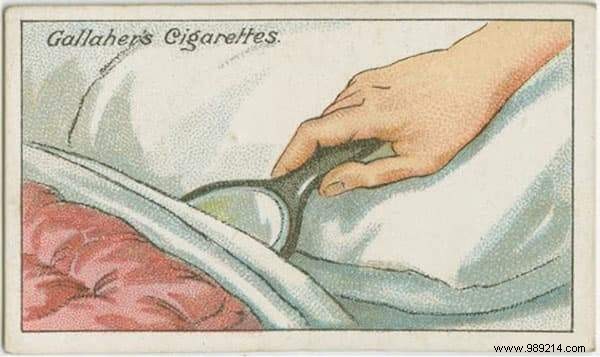
"Pour détecter l’humidité dans un lit inconnu et éviter tout risque, il suffit de glisser un miroir entre les draps, et de l'y laisser quelques minutes. Si, en retirant le miroir, vous voyez une quelconque trace de buée ou d’humidité, cela signifie que le lit est humide et qu’il ne faut pas dormir dedans."
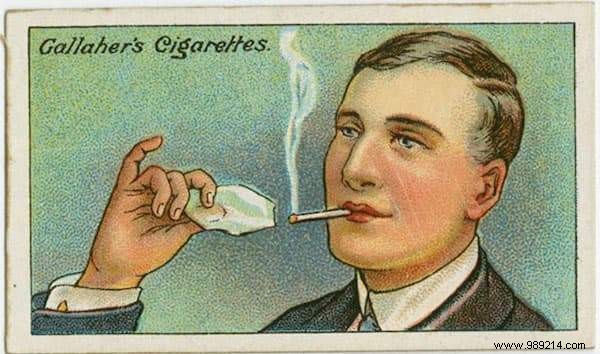
"Ce tour particulièrement surprenant se base sur les propriétés chimiques de l’eau qui entre en contact avec le potassium. Il suffit d'insérer un petit morceau de potassium dans le bout d’une cigarette. Puis, touchez le bout de votre cigarette avec un glaçon. Cela va produire une flamme avec laquelle vous pouvez allumer votre cigarette, au plus grand étonnement de vos amis."
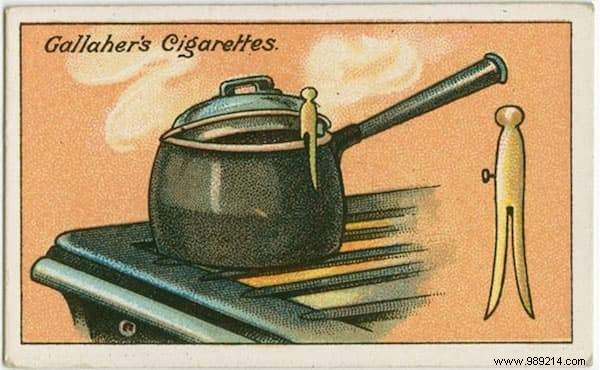
"Un petit objet fort pratique à avoir dans la cuisine est la pince à linge ordinaire. Enfoncez une punaise dans la partie supérieure d’une pince à linge en bois. Puis, fixez la pince sur la paroi de votre casserole, comme vous feriez avec du linge. Vous pouvez maintenant accrocher le couvercle à la punaise, évitant ainsi que le contenu de votre casserole ne déborde."
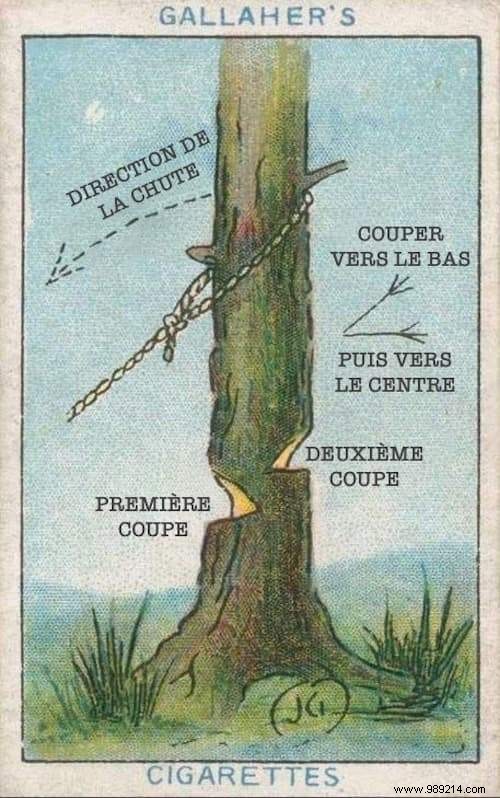
"Choisissez d’abord de quel côté vous voulez que tombe l’arbre à abattre. Puis, alternez entre des coups de hache en angle vers le bas et des coups droits vers le centre, comme dans l’illustration. Lorsque vous avez entaillé le tronc à environ la moitié, faites une deuxième entaille quelques centimètres plus haut et de l’autre côté de l’arbre. Enfin, utilisez une corde pour tirer et faire tomber l’arbre en toute sécurité."

"Un bâton de marche, une canne, et même un mouchoir ou un chapeau peuvent tous être utilisés, comme dans cette illustration. Le chien va toujours s’attaquer à ces objets de défense avant d’essayer de vous mordre, ce qui vous donne le temps de l’immobiliser en le frappant du pied."
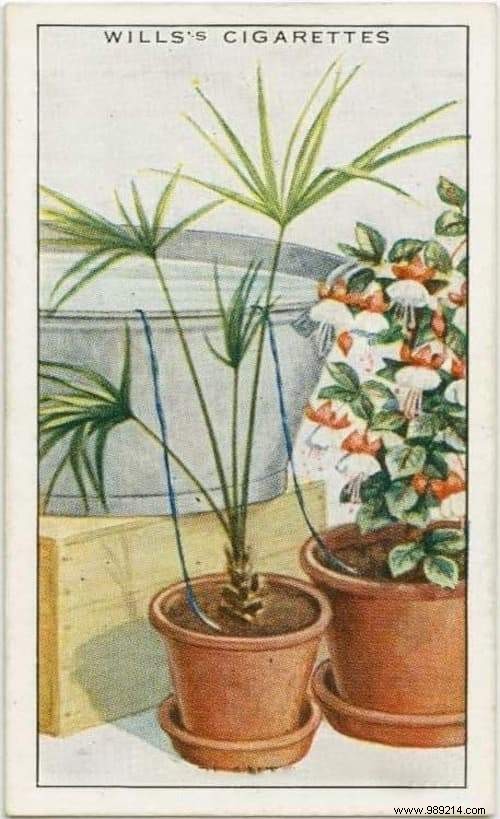
"Remplissez une grande bassine avec de l’eau, et surélevez-la. Placez le plus grand nombre possible de plantes autour de la bassine. Préparez une tresse grossière avec deux ou trois fils de laine. Plongez-la complètement dans l’eau, en laissant un bout au fond avec un poids pour qu’il reste dans la bassine. Mettez l’autre bout de la tresse sur la terre de la plante. Faites une tresse pour chaque plante à arroser."
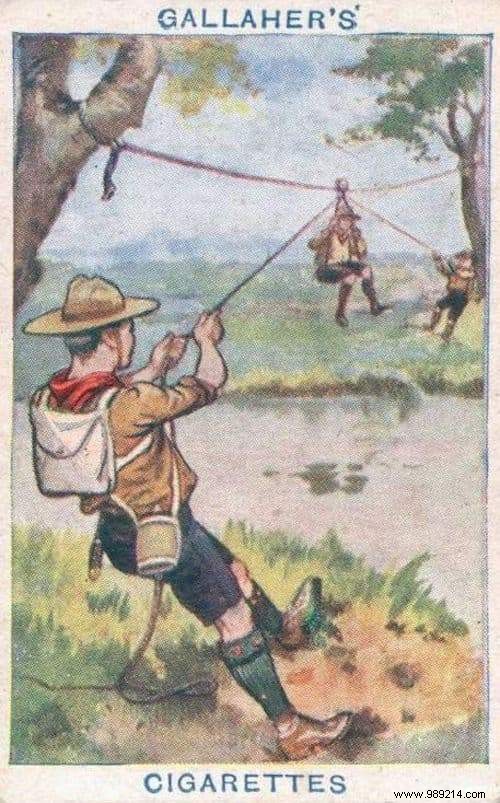
"Attachez une corde bien solide à un arbre, puis demandez à un scout de traverser la rivière à la nage et d’attacher la corde à un arbre sur l’autre rive. Fabriquez une assise, et fixez-la à la corde avec un nœud de chaise ou une poulie. Puis, attachez une corde plus légère au milieu de la nacelle. Des scouts placés de chaque côté de la rivière peuvent utiliser cette corde pour faire passer les personnes qui ne savent pas nager."

"Lorsque vous venez à l’aide d’une personne qui a touché un fil sous tension, ne tentez jamais de la saisir si vos mains ne sont pas protégées. Pour ce faire, utilisez des gants en caoutchouc, un imperméable en toile cirée ou encore plusieurs épaisseurs de tissu sec. Puis, dirigez-vous sur une surface en verre ou en bois, coupez l’électricité et appelez immédiatement les secours."
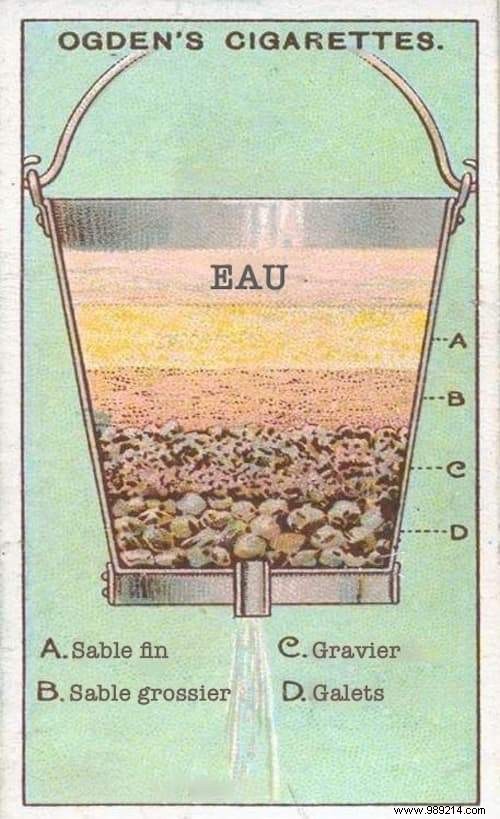
"Pour faire un filtre à eau pratique et efficace, il suffit d’utiliser un seau en métal ordinaire. Percez un trou dans le fond du seau et insérez-y un petit tuyau. Remplissez le seau avec des couches de graviers et galets propres, puis du sable fin et grossier, comme dans l’illustration. En passant à travers ces couches, l’eau sera filtrée et sortira propre par le bas du seau."